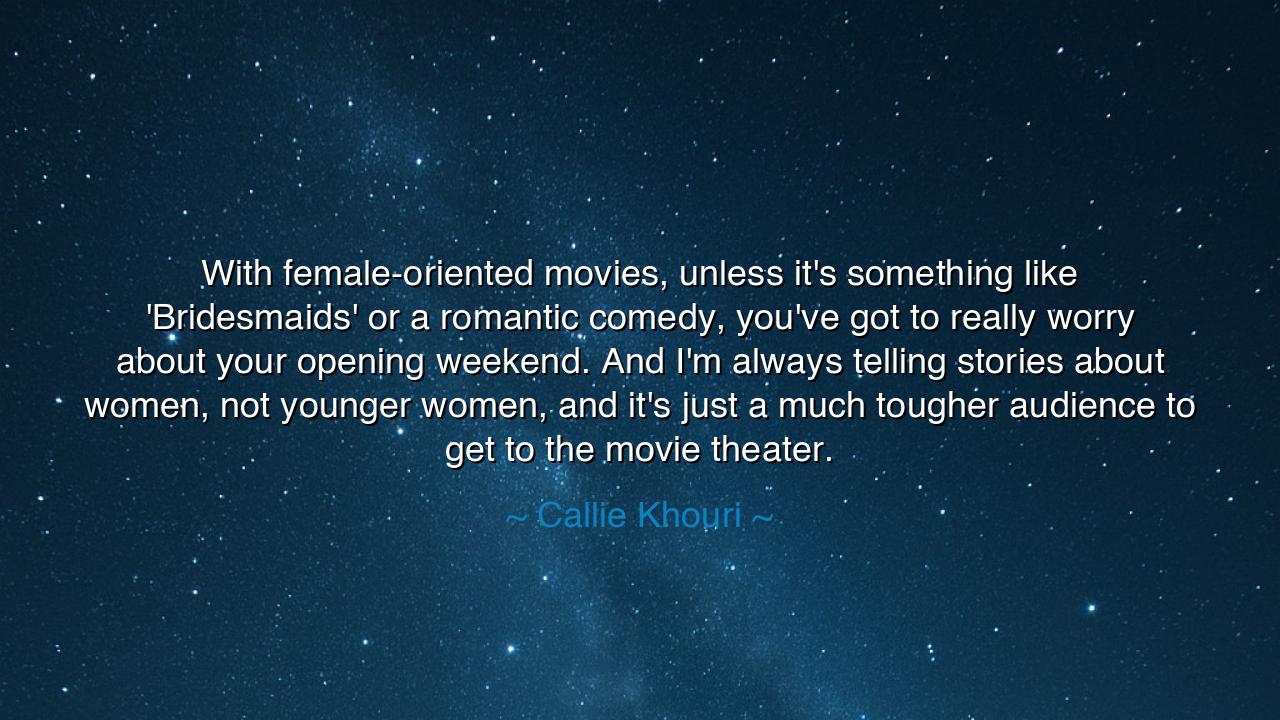
With female-oriented movies, unless it's something like
With female-oriented movies, unless it's something like 'Bridesmaids' or a romantic comedy, you've got to really worry about your opening weekend. And I'm always telling stories about women, not younger women, and it's just a much tougher audience to get to the movie theater.






O Seekers of Truth and Understanding, hear the words of Callie Khouri, who speaks of the challenges and complexities faced by storytellers in a world where the narratives of women are often overlooked or undervalued: "With female-oriented movies, unless it's something like 'Bridesmaids' or a romantic comedy, you've got to really worry about your opening weekend. And I'm always telling stories about women, not younger women, and it's just a much tougher audience to get to the movie theater." In these words, Khouri reflects on the struggle to bring female-centered stories to the forefront in an industry dominated by narratives of action, youth, and spectacle. She sheds light on a deeper truth: the stories of women—especially those that do not fit neatly into the confines of romantic comedy or lighthearted entertainment—are often seen as harder to sell, harder to engage, and harder to portray on the grand stage of film.
In the days of ancient Greece, the great playwright Sophocles wrote about the plight of women through his tragedies, exploring themes of power, sacrifice, and the human condition. Yet, even then, the stories of women were often overshadowed by the heroic tales of men, such as Oedipus or Antigone. The ancient world, much like our own, was dominated by patriarchal structures that relegated the stories of women to the margins, often portraying them as either temptresses or tragic figures. Sophocles, however, introduced us to strong female characters like Antigone, whose defiance of authority and unwavering commitment to familial duty presented a vision of womanhood that transcended the typical tropes of the time. Khouri, in her own way, continues this tradition by telling stories about women who are complex, mature, and multifaceted, refusing to limit their experiences to the narrow scope that society often imposes.
Consider, O wise ones, the story of Clytemnestra, the wife of Agamemnon, who, in her grief and rage over the sacrifice of her daughter Iphigenia, took vengeance upon her husband. Though Clytemnestra's actions were often seen as monstrous, Aeschylus, in his Oresteia, presented her as a character whose deep emotional and moral conflict made her more than a mere villain. In the same vein, Khouri seeks to tell the stories of women who are not confined to simplistic roles, but who are driven by complex motivations—women whose lives and choices cannot be reduced to a formula, but are as layered and rich as the world they inhabit.
Khouri’s observation that female-oriented films often struggle to gain traction unless they conform to certain genres like romantic comedy or broad, mainstream appeal speaks to the broader societal view of women’s stories as secondary or niche. The box office—the measure by which films are often judged and remembered—becomes a battleground where female voices must fight harder to be heard. This is not just a challenge of marketing or distribution, but of societal expectations themselves. Women, Khouri points out, particularly those of mature age, are often not seen as the ideal audience for films that are designed to make a broad cultural impact. The younger audience, typically defined by youthful exuberance and visual spectacle, is more often targeted by the industry, leaving the mature female viewer and their complex realities underrepresented.
Consider the enduring story of Elizabeth Bennet from Jane Austen’s Pride and Prejudice. Though Austen’s novels, centered around the complexities of romantic relationships, have become beloved worldwide, they were often seen in her time as too focused on domesticity and female concerns. Yet, the deeper story of Elizabeth is not merely about romance; it is about a woman who challenges the norms of her society, who refuses to marry for convenience or money, and who, ultimately, seeks self-respect and equality. Austen’s female-centered stories, like Khouri’s, reveal that women’s lives are not just about romance or simple emotional satisfaction, but about growth, empowerment, and resilience.
The lesson here, O Seekers, is one of awareness—to recognize the power of female voices and the value of their stories. Khouri reminds us that the mature, complex woman is often relegated to the periphery, and yet these women have much to teach us about the depth of human experience. We must not limit the stories we tell, whether in film, literature, or art, by outdated or narrow definitions of who should be represented. Female stories, in all their complexity and diversity, are vital to the full representation of humanity. We must dare to tell these stories, not just as an act of cultural progress, but as an act of truth—truths that reflect the complexities, struggles, and triumphs of all people, regardless of gender.
In our own lives, we too must push against the societal constraints that seek to limit the voices and stories of those who are often overlooked or dismissed. Whether in art, work, or relationships, we must make space for the mature, the complex, and the diverse in our understanding of the world. Listen to the stories of those who have been marginalized, and recognize that the fullness of life is not found in the simplistic portrayals of youth or idealized love, but in the real, raw, and powerful experiences of people who have lived through both the joys and challenges of life.
Let us, therefore, strive to create a world where the stories of women, in all their complexity, are not just welcomed but celebrated. Let us challenge the norms, embrace diversity, and lift up voices that have been too long silenced. The world needs all stories, for only in the telling of every voice can we truly understand the fullness of life, the depth of humanity, and the power of connection.






AAdministratorAdministrator
Welcome, honored guests. Please leave a comment, we will respond soon